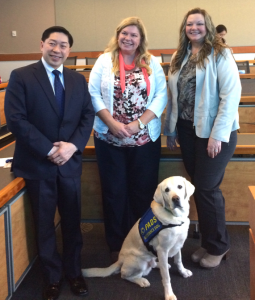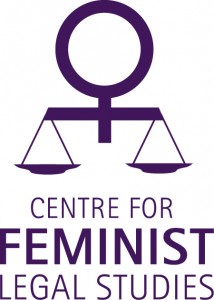The CFLS is delighted to present a new series of student-authored blog posts on current feminist legal topics. These opinion, editorial-style posts were written by Allard Hall JD and LLM students as part of the Women, Law & Social Change course in 2016-2017.
Rape culture accepts sexual violence as a fact of life, when in reality much of what we excuse as inevitable is the expression of values and attitudes that can change. Despite a host of progressive, feminist-inspired law reforms, misguided attitudes toward sexual assault are prevalent in Canadian courts, where decisions have repeatedly come under fire for being informed by myths and stereotypes. But attitudes toward gendered crimes do not confine themselves to state borders nor submit to the optimism of advocates for global justice. At the International Criminal Court (ICC), prosecutors, judges and witnesses hold implicit biases that not only affect decision-making in cases of conflict-related sexual violence, but also influence which cases are afforded their day in court to begin with.
On 16 September 2016, Nadia Murad Basee Taha was appointed United Nations Goodwill Ambassador. When militants captured the city of Sinjar, Iraq in August 2014, Nadia was captured, sold and subjected to grave abuses, while her elderly mother and male family members were murdered as part of the ongoing campaign of genocide against the minority Yazidis perpetrated by the Islamic State of Iraq and the Levant (ISIL; also known as ISIS). Nadia escaped, but thousands of women and girls remain enslaved in ISIL strongholds where girls as young as 9 years old are being bought and sold in slave markets at this very moment.
In a speech to the United Nations in December 2016, Nadia implored the international community to act in response to the ongoing genocide of her people. Yet to this day not one member of ISIL has been held accountable at an international court or tribunal for crimes against Yazidis. When it comes to prosecuting conflict-related sexual violence, accountability is the exception; impunity the rule. Despite the explicit classification of conflict-related sexual violence as a war crime and crime against humanity in international law, the ICC continues to mischaracterize, overlook and under-prioritize conflict-related sexual violence. The pervasive myth that conflict-related sexual violence is ‘opportunistic’ and isolated from the broader conflict is a gross mischaracterization of how militant groups such as ISIL strategically utilize sexual violence as a weapon of war.
While entire communities suffer the consequences war, women and girls are particularly affected due to the prevalence of gendered crimes. Reports from the International Criminal Tribunal for the former Yugoslavia (ICTY) explain that sexual violence “… [was] particularly tailored to [the] goals of driving women from their homes or destroying their possibility of reproducing within and ‘for’ their community.” When innocent women like Nadia stand in the face of genocide, their suffering is no longer confined to the consequences of war. Their bodies become the battlefield itself.
Supposing that conflict-related sexual violence is more about sex and less about violence allows for a second myth, that gathering evidence for these crimes takes ‘extra’ work. The misguided belief that sexual violence is not a core crime makes it difficult to justify allocating the necessary resources to gather witnesses, military records, and other key evidence. But do cases of sexual violence really pose any additional challenge compared with other international crimes? Maxine Marcus, an experienced investigator and prosecutor of international crimes, says not. She argues instead that sexual violence is neglected by international jurisdictions because investigators and prosecutors shy away from sexual evidence.
This was certainly the case at the Nuremberg trials, where the subject was considered “too distasteful” to prosecute. Fifty years later, interviews with judges, prosecutors, and other parties at the ICTY revealed that many of them accepted rape myths, held misogynistic views about women, and felt ambivalent and uncomfortable when dealing with cases of sexual violence. In response to the lack of accountability, one prosecutor confessed, “I get embarrassed asking questions to rape victims”.
Surely sexual violence is a difficult topic to speak about, but that is no excuse not to hold perpetrators to account. If global justice is to be realized, the trend of applying inconsistent approaches to sexual violence as compared to other crime categories must end. This calls for a reasonable allocation of resources, which will only be possible if prosecution offices change their mentality toward conflict-related sexual violence and begin to perceive it as a core crime.
Of course the reluctance to prosecute conflict-related sexual violence is not entirely unreasonable, especially given the difficulties of successfully prosecuting any crime at the ICC. In addition to the overarching challenge of confronting myths and stereotypes about sexual violence, each case presents its own complexities. In the cases of ISIL, there is the issue of jurisdiction. Since neither Iraq nor Syria have signed on to the Rome Statute, a case against top ISIL members would require the support of the United Nations Security Council, which presents its own political hurdles. However, the challenges associated with such cases are not insurmountable and are in fact comparable to those faced by other war crimes, which are readily prosecuted at the ICC.
The international community must be vigilant to ensure that impunity for gendered crimes does not continue to be the norm. As a starting point, the working group of the ICTY suggests prosecuting gendered crimes under the general categories of torture, enslavement, and genocide to contextualize them in the broader conflict. Other improvements would include assigning senior staff to advocate on gendered issues and employing diverse investigative teams to reach out to witnesses. Finally, the international legal community must be sensitive to the needs of survivors and answer the call of victims like Nadia, who are not helpless, but rather courageous enough to call on us for help. We too must be courageous and ensure their cries do not continue to go unanswered.
Rochelle Kelava is a JD student at the Peter A. Allard School of Law and the Centre for Feminist Legal Studies’ Student Coordinator for 2016-2017.
Sources – Academic
Serge Brammertz and Michelle Jarvis, eds, Prosecuting Conflict-Related Sexual Violence at the ICTY (Oxford: Oxford University Press, 2016).
Doris Buss, “Women at the Borders: Rape and Nationalism in International Law” (1998) 6:2 Feminist Legal Studies 171.
Doris Buss, “Performing Legal Order: Some Feminist Thoughts On International Criminal Law” (2011) 11 International Criminal Law Review: Special Issue on Women & International Criminal Law 409.
Doris Buss, “Knowing women: Translating Patriarchy in International Criminal Law” (2014) 23:1 Social & Legal Studies 73.
Christine Chinkin, “Gender-Related Crimes: A Feminist Perspective” in Ramesh Thakur and Peter Malcontent (eds), From Sovereign Impunity to International Accountability: The Search for Justice in a World of States (United Nations University, Press, 2004) 116.
Anne-Marie de Brouwer, “The Importance of Understanding Sexual Violence in Conflict for Investigation and Prosecution Purposes” (2015) 48 Cornell International Law Journal 662.
Margaret M. DeGuzman, “Giving Priority to Sex Crime Prosecutions at International Courts: The Philosophical Foundations of a Feminist Agenda” (2011) 11 International Criminal Law Review 515.
Margaret M. DeGuzman, “An Expressive Rationale for the Thematic Prosecution of Sex Crimes”, in Thematic Prosecution of International Sex Crimes, Morten Bergsmo, ed. (Torkel Opsahl Academic EPublisher, 2012).
Dakshita Sangwan, “Sexual Offences in International Law” (2012-2013) 12:13 ISIL Year Book of International Humanitarian and Refugee Law 259.
Sources – Reports and UN Documents
ISIS Escapees Describe Systematic Rape: Yezidi Survivors in Need of Urgent Care, Human Rights Watch, 2015.
ISIS is Committing Genocide Against Yazidis, UNOHCHR, 2016.
Report on the Protection of Civilians in Armed Conflict in Iraq: 6 July – 10 September 2014, UNOHCHR, 2015, at 12-16.
Report of the Office of the United Nations High Commissioner for Human Rights on the Human Rights Situation in Iraq in the light of Abuses Committed by the So-Called Islamic State of Iraq and the Levant and Associated Groups, UNOHCHR, 2015, at 16-49.
Geneva Convention Relative to the Protection of Civilian Persons in Time of War, 12 August 1949, 75 UNTS 287.
Protocol Additional to the Geneva Conventions of 12 August 1949, and Relating to the Protection of Victims of International Armed Conflicts, 8 June 1977, 1125 UNTS 3.
Protocol Additional to the Geneva Conventions of 12 August 1949, and Relating to the Protection of Victims of Non-International Armed Conflicts, 8 June 1977, 1125 UNTS 609.
Rome Statute of the International Criminal Court, 17 July 1998, 2187 UNTS 3, arts 7(1)(g), 8(2)(b)(xxii)-(e)(vi) (entered into force 1 July 2002).
Women Peace and Security, SC Res 2106, UNSC, 6984th session, UN Doc E/13-37215, 24 June 2013, at para 2; and Women Peace and Security, SC Res 1820, UNSC, 5916th session, UN Doc E/08-39144 19 June 2008.





